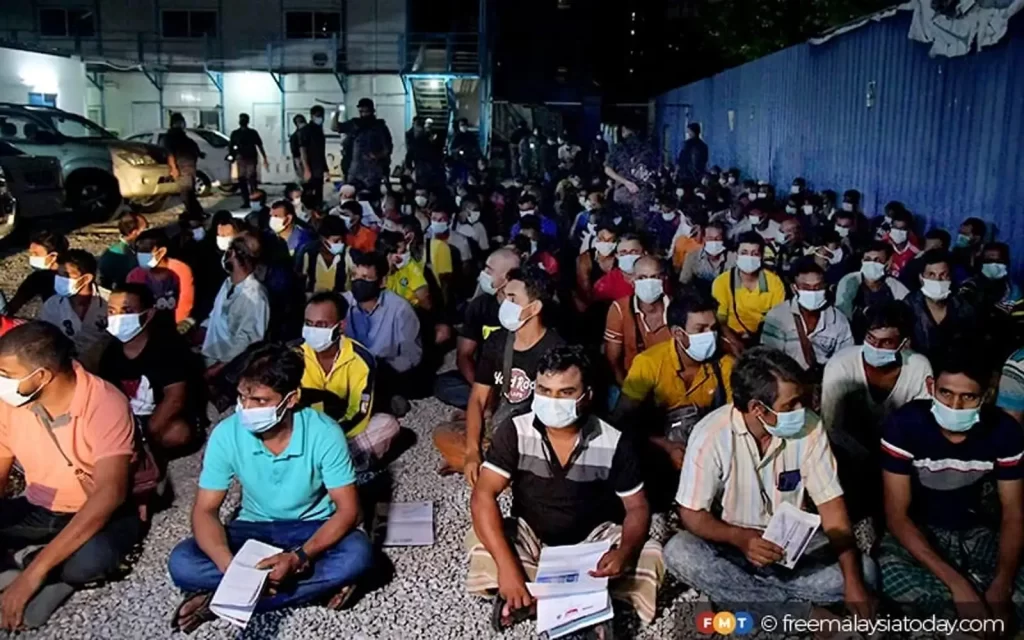PETALING JAYA: Industry groups have urged the government to penalise irresponsible employers who engage in excessive recruitment of foreign workers that have left many stranded in the country without jobs.
Malaysian Association of Employment Agencies president Foo Yong Hooi said the actions of these companies were unethical and have contributed to the escalation of human rights concerns.
“The government must take stern action and penalise them. Such entities tarnish the industry’s reputation and impose costs on legitimate businesses that genuinely require foreign workers,” he told FMT.
Foo said some employers abuse the quota by applying to bring in more migrant workers than they need.
“When employers over-order and receive approval, they often abandon the surplus workers upon realising they have enough. This leaves many stranded when they arrive, even though they were promised employment.
“Ultimately, the employers should be responsible for their applications.
“Employers submit their applications online through the Foreign Workers Centralised Management System (FWCMS). Approval is also granted online by the officers of the relevant agencies under the human resources ministry.
“Once the ministry gives the approval, employers will proceed to use the FWCMS for the next steps,” he said.
However, he maintained that the FWCMS has nothing to do with the foreign worker issue.
“The system does not grant approval for foreign worker quotas. It is just a platform to process (applications). From the employers’ perspective, the system has been a game-changer and many are happy with it,” he said.
In use in Malaysia since 2015, the FWCMS is aimed at centralising, systemising and expediting the recruitment of foreign workers while curbing abuses in the process.
Malaysia National Association of Employment Agencies president Fiona Low said the real responsibility for the issues faced by foreign workers lies with employers and irresponsible agents who facilitate their approval for entry into the country.
“If there are issues of worker overload, the blame lies with the employers and uncertified or unscrupulous agents involved in the recruitment process. To prevent such occurrences, our foreign worker management system must be enhanced to eradicate these syndicates,” she said.
Low said the FWCMS was good for the industry in terms of ensuring transparency and speed in hiring workers to meet employers’ needs.
She said any misuse or abuse of the system stems from employers’ misinterpretation or exploitation of government policies rather than inherent flaws in the system itself.
“FWCMS is better than the old manual (system), which created loopholes caused by human errors and mismanagement. The FWCMS is relevant and necessary for today’s advancements,” she said.
Kuala Lumpur and Selangor Indian Chamber of Commerce and Industry president R Nivas said the human resources ministry has adopted stricter measures to curb excessive foreign worker recruitment.
The ministry had said it would blacklist employers found guilty of bringing workers to Malaysia legally without having ready jobs for them. It also warned that these employers run the risk of having all foreign worker quotas issued to them cancelled.
“We have to show more proactive measures to curb the issue. For instance, ensuring compliance with (worker) housing regulations under Act 446,” Nivas said.
The Workers’ Minimum Standards of Housing and Amenities Act 1990, or Act 446, mandates minimum housing and amenity standards for workers, ensuring they are provided with safe and suitable accommodation.
“The government has to charge perpetrators (who flout the law) and bring them to court. Raising awareness among employers about human trafficking is also crucial in curbing human exploitation,” he said.
Stay current – Follow FMT on WhatsApp, Google news and Telegram
Nivas said the government must continuously engage industry players on foreign worker issues, describing it as pivotal for the nation’s economic growth.

